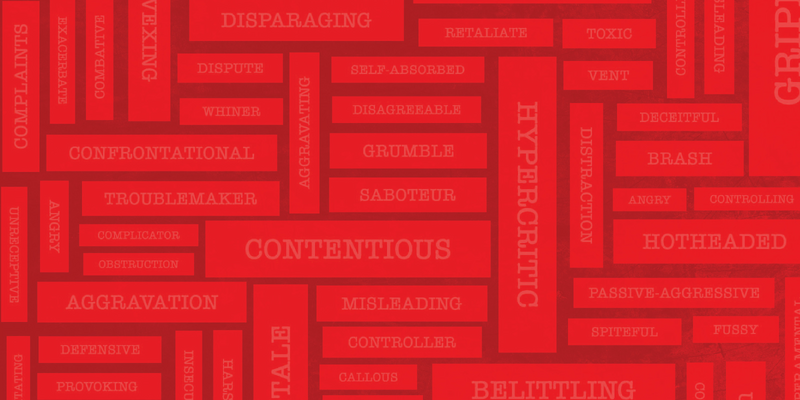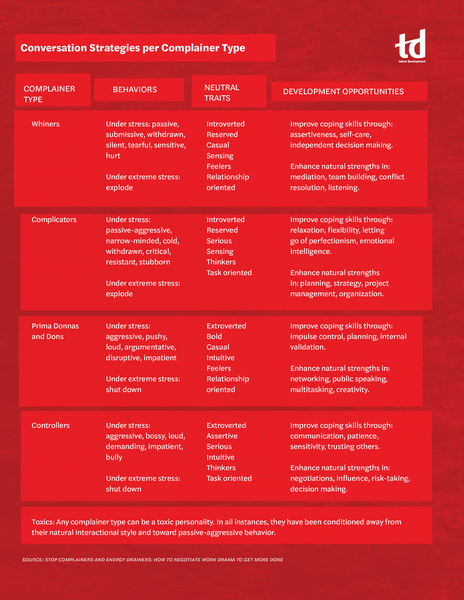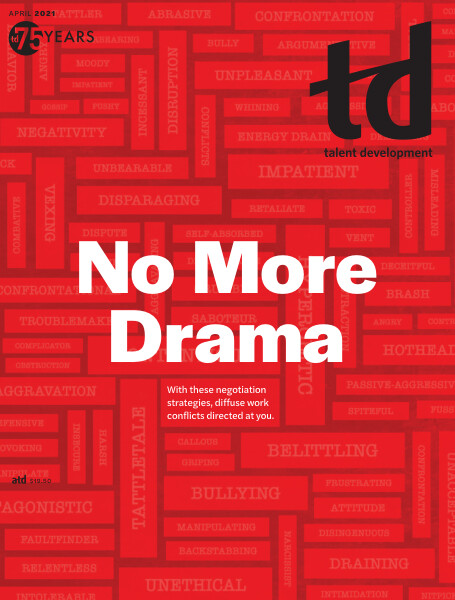TD Magazine Article
No More Drama
With these negotiation strategies, defuse work conflicts directed at you.
Thu Apr 01 2021

Bookmark
As a talent development professional, you are aware of the damage that work drama creates in your organization and work environment. You probably have observed a variety of negative behaviors that can suck the resources, time, energy, and joy out of work and life. In your role, you may have even designed programs or solutions for resolving conflict or managing stress.
During my 10 years of practicing employment law and working as a mediator, I dealt with highly inappropriate actions and illegal harassment. However, most of the time, my clients wanted effective strategies to deal with the negative actors. They saw how complainers and energy drainers decreased production, lowered retention, and made everyone miserable. Concerned about the risk of potential legal ramifications and a loss of reputation, business owners and leaders wanted to know how to "fix or fire" the employees creating the work drama. Clients who were victims were worried for safety and future professional opportunities.
When conducting research for my book Stop Complainers and Energy Drainers, the results revealed I underestimated the expense of these unnecessary work conflicts. Out of the more than 1,000 respondents, 78 percent said they spend a minimum of one to two months during their work year dealing with a negative person or energy-draining situation. Most respondents would turn down raises and promotions if it meant working with a constant complainer. And 11 percent have left a job due to work drama.
The stakes are even higher when that conflict and work drama is targeted directly at you.
Negotiation strategies can positively stop work drama
Many good resources address ongoing conflict at work. However, do you honestly want to continue having tough conversations, managing the unmanageable, or dealing with difficult people? Most people do not want those never-ending discussions with repeat offenders. They simply want the complaining and negative behavior to stop.
The bad news is that most chronic complainers will not stop complaining. The good news is that with negotiation, you can usually get the complainer to stop complaining to you.
Negotiation is the most effective way to end negative behavior that is directed at you. In a negotiation, you have a focused objective. You ask questions to determine interests to be addressed and attempt to satisfy wants and needs logically. When negotiating, you reach an agreement or understanding; or you agree to disagree, delay, or walk away. Instead of never-ending, stressful conversations, there is a clear ending to your discussion. Whether you reach a result or an impasse, all parties clearly know what steps come next. And then you stop.
Every effective DEAL, or negotiation, has four elements to consider: decide, engage, accommodate, and leverage.
Decide
If you are ready to negotiate a solution to your work drama, decide to reframe the way you respond. Most talent development professionals are encouragers and support others' growth. If you have a high need to be understood or liked, choose to uninstall your "like me" button. You will not win over chronic complainers by letting them vent, reasoning with them, solving their problems, redirecting their focus, agreeing with them, or giving them chocolate.
Chronic complainers are self-absorbed. Instead of working through differences and collaborating on solutions, these people are choosing negative behavior to get what they want. They can gossip, protect their turf, cause delays, ignore mistakes, play politics, and create a negative environment. Their complaints and behavior are not designed to correct problems or to contribute; they are focused on themselves.
While you will continue to be respectful, your attempts at reasoning or efforts of kindness have the opposite effect on constant complainers. You'll only encourage more bad behavior.
Engage
There are two key points to learn before engaging with chronic complainers. First, not all complainers are alike. Second, people create work drama for their own reasons, and those reasons may not make sense to you.
When people are constantly unpleasant or creating drama, they are seeking to fill specific needs, from empathy and attention to stability and control. Before you engage, observe their behavior.
Based on my research, there are five common patterns of behavior when people are complaining or acting unpleasant: whiners, complicators, prima donnas and dons, controllers, and toxics. Often one or two of those unpleasant styles will irritate you more than others.
Whiners will moan and groan. They vent, gripe, and become frustrated with themselves and others. They may pout, sulk, and withdraw. Whiners feel overwhelmed and do not see a way out. And they focus on the problem and the past instead of solutions and the future.
Complicators criticize, obstruct, nitpick, confuse, and impede others. They are good with a lot of information and details, but change disrupts their version of certainty, order, and stability. These individuals complain to block disruptions to established structure or predictability and to avoid feeling vulnerable or incompetent.
Prima donnas and dons interrupt, ignore their jobs, seek self-serving attention, and make inappropriate remarks. They disrupt and create scenes. Primas want to be seen and heard and will create opportunities—even negative ones—to interact with others.
Controllers may use an angry tone and be abrupt, demanding, and loud. They like to get things done and will bulldoze over people they believe are in the way. Controllers do not want delays, to work for people they do not value, or to waste time. These individuals also intimidate others or create fear.
Finally, toxics thrive on chaos and know how to use charisma to mislead others. Deceitful, deceptive, and charming, these individuals use misinformation to manipulate the environment and further an agenda that appears to be based only on their self-interests. They exploit others, are passive-aggressive, and have no empathy for others.
Accommodate
There is no one-size-fits-all solution for work drama. But by understanding the common reasons and possible needs the individuals seek from their negative behavior, the actions that do not work for each complainer type, and the best strategies for you to negotiate with each, you can quell the negativity around you.
Whiners are overly sensitive, moody, sulky, and crabby as a means to gain reassurance, guidance, direction, and a connection to others. Stop giving reasons why their reactions are irrational. Whiners want empathy, not logic. The worst thing you can do is vent along with them or solve their problems. On the rare occasion when they accept and act on your suggestion, they will blame you if the result is bad. Even worse, if the advice works, you have encouraged more whining and have become their crutch for making their future decisions.

The best way to negotiate with whiners? Listen, empathize, and ask them for solutions. (And repeat.) For example: "That sure sounds like a rough situation. What are you going to do about that?" and "Wow. I sure am glad that is not my problem. How are you going to handle it?"
Complicators impede, delay, criticize, complicate, and obstruct solutions as a means to maintain their version of order, certainty, and stability. Stop telling them to be team players. And do not employ the other extreme—excluding them from team meetings—because they will increase delays and criticize solutions created in their absence. The worst thing you can say is to ask them to have a better attitude and be more supportive. Complicators are concerned more with being right and having correct systems than improving relationships.
The best way to negotiate with complicators? Slow down, overcommunicate, respect their past efforts, and present changes as an upgrade or as mandated by a higher authority. If complicators understand the change is inevitable, their fear of being left out of the knowledge overrides their need for stability. For example: "Our \[leadership, board, customers, citizens, the law\] requires the change, and the transformation is happening. Your expertise would be valuable in this upgrade."
Primas are the organization's drama queens and kings. They gossip and stir up trouble. They are brash, excessive, reactionary, erratic, and dramatic as a means to seek attention.
Stop describing why their reaction is too extreme and excessive. For primas, negative attention is better than no attention at all. The worst thing you can do is ask them to be rational. They seek the spotlight and will increase their negative behavior if they feel embarrassed or ignored.
What is the best way to negotiate with primas? Acknowledge them, avoid getting lost in the drama or derailing, and be clear what behavior you positively acknowledge. For example: "Hi. I was surprised with that new issue you raised in today's meeting. Your passion was obvious. I emailed the team so that team members can contact you with any future questions." Or: "Hello. No, your call is no interruption at all. In fact, if you have the time, I have several projects you could help me complete." Note: Do not delegate any project that is critical to your success. And if the prima surprises you and accomplishes the project, make sure to celebrate and publicly recognize their accomplishment.
Controllers use demanding, intimidating, aggressive, and demeaning behavior as a means to get others to yield to their authority, motivate others to act, and get rid of restraints. They are attempting to reach an outcome by controlling situations and people.
Stop finger-pointing or making excuses, or you will aggravate them more. Likewise, do not cower or avoid eye contact because of their aggressive demeanor. Assertiveness works; aggressiveness does not. The worst thing you can do is appear as if you are ready to engage in a hostile counteroffensive. Do not try to match controllers in voice or body demeanor. They are comfortable in verbal combat and usually win.
What is the best way to negotiate with controllers? Calmly stand up to them, have a problem-solving approach, and allow them to decide the next steps to get things done. Allow them to choose from a few options that you can deliver. For example: "Yes, I know where those documents are. Do you want to wait until 2 p.m. when my meetings finish, or do you want to contact the person who has them?"
Toxics will use misinformation to manipulate and poison the environment. The most dangerous of the negative styles, these individuals are narcissists who are deceitful and deceptive. They use charm to disarm in their attempts as a means to gain control and to further their self-absorbed agendas.
Stop describing why their reaction is causing problems with co-workers. Toxics care about one thing: themselves, not the trouble they cause others. The worst thing you can do is appeal to their sense of duty or doing right. Toxics are not troubled by society's moral values. Their lack of concern for others enables them to act and achieve results, often without conscience or regret. And do not confide in them or attempt to relate your similar experiences, because they will use your comments later as ransom or to backstab you.
What is the best way to negotiate with toxics? Protect yourself and your reputation. Document their exact words and behavior as proof to yourself that you are not irrational. Keep those notes somewhere safe—you may need to provide your observations as evidence in the future.
In addition, watch others' actions that produce positive results with toxics and attempt to copy that approach. Get advice from mentors, a coach, a counselor, or HR professional. Whenever possible, steer clear and avoid toxics. If necessary, consider transferring to a different project or team. Warning: Not much works with these individuals. They are not your friends, and they will retaliate if they believe you are a threat.
Feeling brave? You will never outmanipulate toxics; however, you can let them know you are on to them and are willing to call them out on their behavior every single time. For example: "You threw me under the bus today at the meeting. You did not speak up as we agreed on Tuesday. That is not how professionals get things done." Toxics will lie or make excuses, but at least you send a clear signal that you have blown their cover now and for the future.
Leverage
Leverage what you know to negotiate effectively with work drama. Ignored work drama can be contagious. Not addressing it when it's directed at you can appear like you agree or welcome the negative behavior.
Just as important, leverage what you know to spot when you could be creating work drama for others (see sidebar).
Are you ready to DEAL with that work drama differently?
In the future, how will you negotiate with those complainers who choose to avoid responsibility or negatively impede another's growth? What strategies will you use to DEAL when negative behavior and work drama is aimed at you?
Now is the time to DEAL with that work drama. Decide how you want to engage others. Make sure you are accommodating your needs, as well as responding to theirs. Then leverage the knowledge and tools you possess.
Are You the Source of Work Drama?
Could your behavior be considered a problem? There are many reasons you may be complaining. For instance, if you are overworked, unsure where your next client will come from, or uncertain about your job, life can feel out of control. Health issues, travel restrictions, and family demands create stress. You may want more direction and feedback from your leaders. Like many professionals who encourage growth and opportunities for others, you may be forgetting about your own development and training needs.
When you are under stress, it helps to identify which complaining behavior(s) you are exhibiting, how often you are complaining, and what need you are trying to meet. Remember: You may just be venting. But be realistic about how often you are exhibiting the behavior.
Your venting gives valuable insight into areas that need improvement. If possible, fix the situations that are draining your energy. Are your complainers causing you to react negatively? If so, consider taking a break. Pause so you can breathe and think rationally before reacting. Your capacity to function, think, and produce good results relies on your ability to stay cool, calm, and in control.
Remind yourself that there are better ways to get things done, express yourself, and be recognized for your contributions. When you learn to communicate and negotiate more effectively, people gravitate to you. They connect, let down their guard, and listen to your requests.

